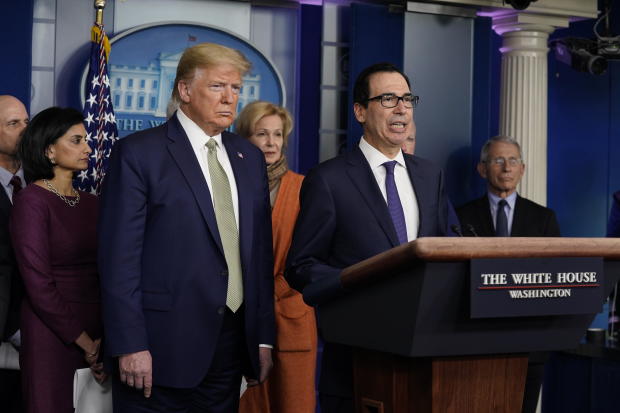White House and Senate focus on $1 trillion coronavirus stimulus package
Washington — Congress and the White House moved quickly to craft the parameters of a massive stimulus bill to prop up the economy in response to the coronavirus crisis on Tuesday. Senate Republicans took the lead on a package that could cost upwards of $1 trillion.
A senior Republican official told CBS News, based on Tuesday's lunch discussions with Senate Republicans and conversations with senators throughout the afternoon, that the package will likely include roughly $50 billion in assistance for airlines, $250 to $300 billion in small business loans, and $250 billion in direct payments for Americans to be paid in April.
These direct payments may be structured in a way similar to the tax rebate in 2008 in the midst of the financial crisis. In that case, individuals received a designated amount, married couples received a certain amount, and additional funds were given based on the numbers of dependent children.
The direct payments are planned for those who fall beneath an income threshold. It's not yet clear how the payments will be funded. For the time present, the payroll tax holiday favored by the president is not under consideration in the package.
Senate Majority Leader Mitch McConnell said in a press conference on Capitol Hill that senators will first vote on an earlier aid package that passed the House over the weekend before moving on to a much larger "phase three" deal outlined by administration officials just hours before.
"We're going to move in warp speed for the Senate, which almost never does anything quickly," McConnell said. "These are not ordinary times. This is not an ordinary situation, and so it requires extraordinary measures."
Treasury Secretary Steven Mnuchin, who is leading negotiations for the administration, traveled to the Hill to discuss the measure with senators over lunch on Tuesday.
"We just finished discussions at the president's request with the Republicans. I know there's been some rumors of the number. It is a big number," Mnuchin said afterward. "This is a very unique situation in this economy. We've put a proposal on the table that would inject a trillion dollars into the economy."
The "phase three" proposal follows an initial $8.3 billion measure passed earlier this month to boost emergency funding, and the House legislation approved early Saturday providing paid sick leave and family leave to some workers forced to remain at home over the outbreak. This "phase two" bill passed in the House has a potential price tag of $104.9 billion over ten years, per the Joint Committee on Taxation.
The aide said that the phase two bill is expected to be passed in the Senate on Wednesday, and phase three by the end of the week.
At a press briefing at the White House, Mnuchin said the administration wants Congress to approve measures to get cash in the hands of consumers within the next two weeks, a proposal floated by Republican Senators Mitt Romney and Tom Cotton, among others.
"We're looking at sending checks to Americans immediately," Mnuchin said. "We have to do this now."
McConnell said senators will remain in Washington until they approve a phase three deal, and said Republicans who were reluctant to approve some provisions in the House's bill should put aside their concerns for the time being.
"We're not leaving town until we have constructed and passed another bill," he said. "My counsel to them is to gag and vote for them anyway, even if they have some shortcomings, and to address those shortcomings" in the next bill.
Senate Minority Leader Chuck Schumer said Democrats will support the House bill. He had proposed his own phase-three deal worth $750 billion on Monday, but said Tuesday the final figure "may have to be higher" than $1 trillion.
House leaders are also looking toward the next phase of the response, with Speaker Nancy Pelosi laying out Democratic priorities in a third package. In a statement, she said the third phase of the response should include expansions of sick leave and family leave for workers, as well as tax credits to support the self-employed and gig workers.
White House legislative affairs director Eric Ueland told reporters Monday that the price tag of any such measure was no issue for the president.
"The president has instructed his team to look very expansively at what we need to do and not be impeded by the potential price tag of what's necessary here," Ueland said.
Mnuchin echoed that point on Tuesday, saying concerns over the price tag for a stimulus bill are secondary.
"I've said in different times, we'll fix the deficit," he said. "This is not the time to worry about it."




